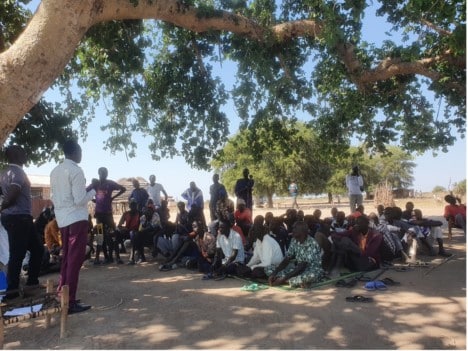South Sudan
Thematic areas: Humanitarian Norms – Landmine Ban – Famine – Protection of Healthcare – Gender
In South Sudan, the 2018 Revitalized Agreement on the Resolution of Conflict brought a reduction in armed conflict. However, non-signatory groups like the National Salvation Front (NAS) and South Sudan United Front (SSUF) have contributed to clashes, particularly in Central and Western Equatoria, despite ceasefire efforts. Shifting loyalties among different armed groups has further complicated the situation, with some generals switching sides and militias changing allegiances. Inter-communal violence has surged since 2018, leading to significant death, displacement, and livelihood destruction, especially in Upper Nile, Jonglei, and Warrap States. This type of conflict primarily involves communitarian armed groups defending their communities and livestock.
The humanitarian situation has deteriorated due to the compounding effects of conflicts, sub-national violence, food insecurity, climate crises, and public health challenges. Climate-related crises, delayed rains, excessive rainfall, and severe flooding have disrupted crops and food security, and economic hardships have worsened as the local currency depreciates, affecting purchasing power.
The 2018 Peace Agreement’s extension to December 2024 aims to conclude with the adoption of a new constitution and democratic elections. While there is international community fatigue due to the slow implementation of the necessary milestones in the Peace Agreement, the peace process continues with regional organizations like the Intergovernmental Authority on Development and the African Union, along with the UN’s support through UNMISS. Dialogue with non-signatory groups remains a challenge despite these efforts.
The Main protection concerns – other than the ongoing violence – remain SGBV, child protection, food security, and access.
Geneva Call’s activities in the country
Trust-Building
- Established constructive relationships with national authorities and participated in humanitarian coordination mechanisms.
- Gained permission to operate from the National Security Services, and Governors in states of operation.
- Build relationships with various AGDA leaders.
- Successfully aligned with local cultural norms to be welcomed by local authorities and community leaders.
Community Strengthening
- Community leaders and civil society members have demonstrated an improved understanding of International Humanitarian Law (IHL).
Concrete Actions
- Balanda chiefs in Western Equatoria persuaded armed groups to remove roadblocks, facilitating the movement of vulnerable groups.
- In Warrap State, Gelweng leaders acknowledged the negative impact of destroying civilian infrastructure during conflicts and discouraged such actions.
- The chief of Ikpiro in Yambio organized an awareness-raising session on the prohibition of sexual and gender-based violence.
- Three Unilateral Declarations signed with Gelweng (armed cattle keepers) from three Payam’s – Awul, Rualbek, and Mareng Noi/Warrap – on the protection of civilians, of civilian property, and on the protection of women, children, and displaced people.
Key figures
The United Nations reports that around 9.4 million people, constituting 76% of the country’s population, are in need of humanitarian assistance in 2023.
Over 200 AGDAs trained on IHL/IHRL in 2023
Over 250 CSO members and community leaders have been trained on IHL/IHRL.
100 state forces engaged with a Geneva Call briefing to raise awareness of IHL among the troops.
Engagement with 6 AGDAs (NAS, SPLA-IO Gatwech, SPLA-IO Olonji/Agwelek forces, SPLA IO, White army, different community based-tribal militias or/and self-defense forces); CSOs including women, youth, and interfaith groups (self-protection); community, religious, spiritual, and tribal leaders, and influencers (as agents of change).
Contact information:
Ranjan Poudyal – COUNTRY DIRECTOR
rpoudyal@genevacall.org
